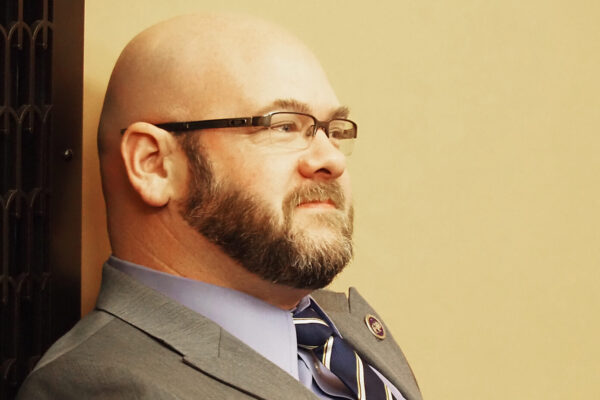TOPEKA — Juvenile justice advocates pushed Monday to eliminate youth fines and fees in Kansas, arguing the practice runs contrary to the goal of rehabilitation, instead of leading to a cycle of recidivism.
Tyler Williams, a youth leader for Progeny, a youth and adult partnership focused on reimagining the juvenile justice system, said that when he was younger a court ordered him to pay more than $1,000 in restitution to Geary County for transport from Oklahoma City to Junction City and court costs. For years, Williams had paychecks and money sent to him halved to pay these fees.
Even after his release, Williams said, he could not keep up with the onslaught of fines. Luckily, he had a strong safety net to help he needed it most.
“If we really want to help rehabilitate kids back into society after one mistake, then we need to stop trapping them in a financial crisis with no feasible way out,” he said. “We need to end the insanity of treating kids like adults.”
In an information hearing held by the House Corrections and Juvenile Justice Committee, led by Rep. Stephen Owens, R-Hesston, several Kansas organizations touted a bill draft that would end fines and fees for juvenile offenders. Currently, Kansas levies several different fines, fees, and costs on young people involved in juvenile court.
The costs cover nearly all interactions with, and services ordered by, the juvenile court.
Lindsey Smith, an attorney with the Juvenile Law Center, said as of 2021, Kansas is one of three states — Michigan and Nebraska — that impose fines and fees on juvenile offenders and their families at eight different points in the system.
“This debt increases children’s stress at a time when they should be focusing on positive engagement in school and community activities — and often when they legally and practically cannot work,” Smith said. “Fees and fines also increase family tension, and parents report being forced to choose between buying basic necessities like groceries or school uniforms and paying the court.”
The Kansas Debt Free Justice for Youth Act, a collaborative effort between groups including the Juvenile Law Center, American Civil Liberties Union of Kansas, Progeny, Destination Innovation Inc. and Kansas Appleseed, would eliminate fines and fees for all youth ages 25 and under. As of July 2021, more than a dozen states have taken similar action.
Advocates argued fines and fees also exacerbated racial disparities in the criminal justice system. According to the Gault Center, a member of the Kansas Debt Free Justice Coalition, Indigenous youth in Kansas are 98% more likely to be referred to the court than white youth, while Black and Latino youth are about 75% more likely to be detained than white youth.
“Rather than improving outcomes for children, imposing fees contributes to the unequal treatment of youth who experience the juvenile court system,” said Kristina Kersey, senior youth defense counsel for the Gault Center. “Eliminating fees for youth in Kansas makes sense from a public safety perspective and would place Kansas among a growing number of states, including Texas, New Jersey and Louisiana, undertaking reforms around fees for youth.”
Shawn Jurgensen, special counsel to the chief justice of the Kansas Supreme Court, noted that part of the judicial branch’s legislative agenda this year is to transition funding of core judicial branch functions away from fee funding. However, should that bill fail, he said there would be a fiscal effect on core judicial operations.
Eliminating juvenile fees could pose a bigger issue on the operational side of the judicial system, he said.
“Any retroactive effect could impact those existing agreements or those cases that have already been referred to the debt collection agent, and a retroactive elimination could involve court time and determining how much of that outstanding balance may be collected,” Jurgensen said.
Jurgensen was unable to provide many answers to Rep. Carmichael, D-Wichita, regarding the number of these contracts ongoing and the nature of the contracts.
“Without those answers, I’m not going to find that to be much of an impediment to passing this type of legislation,” Carmichael said. “So, I hope you could look into that.”

